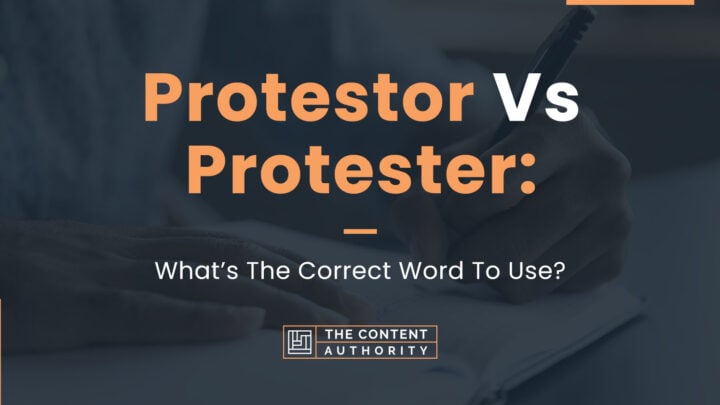Studies show that the past decade has experienced a record-breaking increase in global activism. If you have been following that keenly, you will realize that some news headings have prioritized the words “protester” and “protestor” in their contexts. So, protester vs protestor, what should you use to refer to people organizing and participating in protests?
According to prominent dictionaries like Merriam-Webster and Oxford, both spellings, “protester” and “protestor,” are correct. Both words refer to the person partaking in a protest singly or in a group. A protestor/protester also states a solemn declaration or dissents from an established policy.
Popular publications and new stations have used the words “protester” and “protestor” interchangeably throughout the news coverage of protests. This has caused mass confusion on which of the two terms is correct. Therefore, we have prepared this post to answer any questions on the protestor vs protester question.

Definitions Of Protestor And Protester
The root for the words “protestor” and “protester” is “protest.” Therefore, the best way to define them is by first looking at the definition of protest. Protest means “to express a strong objection to something, especially a policy or a rule. For example, “protest a work assignment or new laws.”
Another meaning for protest is “participating in a public demonstration or opposition to something. For example, “The group organized a protest against the election fraud in Texas.” Also, protest means to affirm earnestly, especially after someone expresses doubt against you.
For example, “Jussie displayed a continued protest against the fraud charges set on him.” Now that you know the definition of protest, the section below should be easy to understand.
Definition Of Protestor
“Protestor” is the noun for someone who protests or participates in a protest individually or in a group. For example, in a sentence, “The protestor traveled 3000 miles to participate in the BLM protest after the incident in France.”
A protestor is also someone who expresses a strong objection to something or one who protests a bill of exchange or a note. For example, “In law, a protester protests a note.”
Definition Of Protester
“Protester” is the alternative spelling for “protestor.” Therefore, the meanings of both words are similar. The word protester comes from the Latin “protestari,” meaning “to declare publicly.” Other sources claim it comes from the French word “protet,” used in the mid to late 1300s.
Protestor Vs Protester: Which One Should You Use In Writing?
The difference between these words is the suffix. In English, the suffix “er” applies when for agent nouns. Note that agent nouns refer to people who do things. For example, a person who writes is a writer, and one who protests is a protester.
In contrast, the suffix “or” applies to specialized or professional roles. For instance, a person who advises is an advisor, not an adviser. However, these contrasts do not apply in all cases. In fact, both words are acceptable. For instance, we can all agree that writing is a professional role like advising. Again, the grammar rules that govern the applications of suffixes “er” and “or” are not straightforward to most people.
When you search for these words in the dictionary, you will notice that the dictionaries list them as each other’s alternatives. You will also notice that “protester” is more common than “protestor.” For instance, most dictionary sites will give you a default return to the definition of “protester” when you search for “protestor.”
So, these words are technically both correct. When it comes to which one you should use, you should base your choice on your personal preference or what you think looks best on your page.
On the other hand, “protester” is more common and most preferred. Interestingly, some editorial standards and writing formatting styles, like AP, refer to “protester” as the correct spelling for “a person that participates in a protest.” Therefore, to be safe, you should use “protestor” as the preferred spelling in writing.
How To Properly Use Protestor And Protester In A Sentence
Now that we have clarified which of the two words you should use, let us get into their proper use in sentences. First, note that both words are nouns. According to English grammar rules, nouns are the most specific words to use in sentences.
This is because they are the easiest to identify, compared to other parts of speech, like adverbs, adjectives, and nouns. Here are some guidelines for using the words “protester” and “protestor” correctly:
How And When To Use Protestor
Use this noun to describe a person who dissents an established policy or a decision, like a demonstrator or activist. For example, “The protestor will arrive on the morning of the demonstration.”
Also, use this word when referring to a person that has made protesting a specialism instead of one that only participates in one demonstration. In a sentence, “Jane is a seasoned protestor.”
You can also use the words’ plural form, “protestors,” in sentences. For example, “The protestors spent hours outside the city hall waiting for the mayor to come out and respond to their claims.”
How And When To Use Protester
Use this word to refer to a person who openly disapproves of something by participating in a protest. For example, in a sentence, “James is an active protester and does not fear admitting to it.”
You can also use this word to refer to a person that believes in a course and gets involved in public demonstrations to show their belief. For example, “The BLM protester went to great lengths to support the cause.”
Also, feel free to use the plural form of this word as “protesters.” For example, “The protesters plan to match from Houston to Washington, like Martin Luther’s team.”

Examples Of Protestor And Protester Use In Sentences
We want you to comfortably use whichever of these two words, depending on your preference and the type of writing you want to do. We have prepared the section below to give you ideas on how you can construct sentences using both words:
Example sentences of protestor
- The protestor went from town to town, gathering support for the demonstration before the public protest.
- Jimmy, the protestor, will appear on CBC news to explain what the demonstrators seek to achieve.
- CCTV footage shows how the protestor entered the mayor’s office by sweet-talking his secretary.
- One protestor refused to leave the premises even after the police arrived, causing his arrest.
- The public outrage against the police started when the activists released video footage of an officer assaulting a female protestor.
Example sentences of protester
- The police officer shook hands with the protester at the forefront to demonstrate support for the course.
- The protester adopted the little boy abandoned at the protest.
- One protestor threw a fire extinguisher at the rear window to help the kids escape.
- Jane, a frequent protester and animal rights activist, will visit the Zoo with the kids to discuss plans he has for endangered snake species.
- If the protestors do not arrive, we will not have a successful demonstration.
Conclusion
Researching the difference between “protestor” and “protester” is not a walk in the park. It is because of the varying opinions. For instance, some internet search results show that “protestor” is the wrong spelling for “protester.” In contrast, some show that both spellings are correct, but “protester” is more common.
That’s why we have created this post that finally provides a comprehensive answer as to which of these two words is correct. We conclude that both words are right. However, using the word “protester” in official writing is safer because it is more recognized and commonly used.
Shawn Manaher is the founder and CEO of The Content Authority. He’s one part content manager, one part writing ninja organizer, and two parts leader of top content creators. You don’t even want to know what he calls pancakes.

